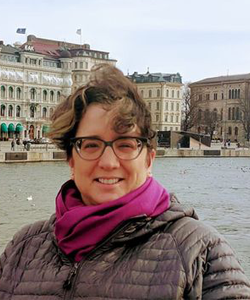Emily E. LB. Twarog (School of Labor and Employment Relations) is a 2021-2022 HRI Faculty Fellow. Twarog’s project “Hands Off: A History of Sexual Harassment Resistance in the US Service Industry, 1936–2020,” historicizes how women workers have resisted sexual harassment in service industry jobs: work that is gendered female, union and non-union, typically low-waged, and often requiring some form of intimate labor. This project centers the body in the relationship between gender and work: regardless of the type of service work, access to women’s bodies is often perceived as part of the service provided. It shifts the narrative away from the victimization of women workers, instead focusing on how women have demanded agency in their workplaces and communities.
Learn more about HRI’s Campus Fellowship Program, which supports a cohort of faculty and graduate students through a year of dedicated research and writing in a collaborative, interdisciplinary environment.
What is unique about your research on this topic?
In my first book, Politics of the Pantry: Food, Housewives, and Consumer Protest in 20th Century America, it was really important for me to break down the silos between various historical foci. For labor historians, the narrative usually centers the workplace as the site of inquiry; my work problematizes this. While we spend a large amount of time at work, it does not define us nor does it explore how we use our wages. However, when we begin to organize for a better workplace those experiences bleed into other parts of our lives. In Politics of the Pantry, I engaged as a labor historian with the home as the focal point and used the idea of “domestic politics” to explore how working- and middle-class white women used consumer protest to extend the buying power of their husbands’ wages.
My second strand pulls more from my work as a labor educator in the School of Labor and Employment Relations. Traditionally, labor educators teach non-credit classes to workers—typically unionized workers—and they do not have research expectations. At the University of Illinois, we are unique. We must be able to navigate multiple worlds: in the evening, we teach labor history to a class of adult learners; the next morning, we teach undergraduates a class on the global economy and women workers; and the afternoon, turn to our research and writing. There is never a dull moment. Early on in my career, I began to use my experiences with individual women workers and unions to research and write about women’s leadership development in labor unions.
What drives your interest in this research?
The times that are most exciting to me is when I see these two strands intersect. In my current project, “Hands Off: A History of Sexual Harassment Resistance in the US Service Sector,” I am exploring how workers—in particular women and LGBTQ workers—resist sexual violence in the workplace. It is the perfect opportunity to bring these two strands together. While I am engaging in archival research, I am also using my experiences as a labor educator to understand the ways in which unions and community organizations today are organizing to stop sexual harassment.
“Seeing the long arc of resistance brings a new light to current organizing and is what drives me to continue when I get frustrated with the limits of the archive or overwhelmed with the emotional toll that studying sexual harassment can take on me.“
For example, I recently published a chapter on an ordinance that was passed in Chicago that would require all hotels to provide housekeepers with panic buttons to alert security if they feel at risk of sexual violence or harassment. This ordinance sent a clear message to the hotel workers that the guest was no longer a protected population, their voices would be believed. I interviewed hotel workers who worked on this ordinance and was in the City Council chambers when the ordinance was passed. Being able to put this current event into historical context and share it with students and scholars of work is the most fulfilling aspect of my research and writing.
